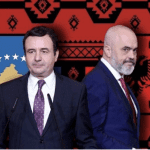By Genc Pollo
On 31 March 1991, four months after the founding of the first opposition party, the Democratic Party, the first pluralistic parliamentary elections since the 1940s took place in the country. The ruling Communist Party won about two-thirds of the seats.
Based on the Constitutional Provisions adopted a few weeks later that guaranteed a democratic political order, Ramiz Alia, the Communist dictator, was elected President of the Republic with this two-thirds of the votes in Parliament.
One year later, on 22 March 1992, in the first parliamentary elections, that were truly free and fair, the opposition Democratic Party won nearly two-thirds of the seats. Ramiz Alia resigned after a couple of weeks. He was only one year into a five-year term, and the Constitutional Provisions established that a President could be dismissed only if convicted for high treason or because of a health impairment, or if he resigned voluntarily.
And although the new majority did not have the legal means to remove Alia from office, he wisely realized that for him, a relic of the Communist past, cohabitation in the new era was not an option. Perhaps one can be surprised when I present as a model of political maturity the last act of the last communist ruler; as he can be blamed for many past criminal deeds. Still history, viewed neutrally, could teach us something.
Three decades later, the Democratic Party held an internal leadership vote in the wake of the defeat in the 25 April 2021 parliamentary elections. A majority of about two-thirds voters reconfirmed the same party leaders. Barely half a year later, a two-thirds majority of the delegates of the party congress want to change not only the statute and the program of the DP but also its leaders. In the party membership the support for these changes is even higher.
In both cases the majority, as a political pendulum, shifted from one side to the other within a short time. Comparisons in history are not easy; but there is a parallel between the pendulum in 1991-92 and in 2021. The most obvious explanation for the first vote that reconfirmed the Communist Party in 1991 and the DP leaders after 25 April 2021 was lethargy and inertia. Voters were not yet aware of the need for change as well as of their agency to make that change. The second vote clearly takes place after the advent of awareness and liberation along with the possibility of choice.
With the reaction to the pendulum swing by the communist ruler and by the current leaders of the DP, the similarity ends and the contrast begins. The DP leaders initially denied a priori the possibility of convening a party congress even though this was a clear statutory right of its delegates. Then, when the congress initiative took shape and weight they rejected it again: they said they wouldn’t allow such a congress as it would be “anti-American” “scummish” and “haxhiqamilist”**. However, they didn’t explain how they would lead and represent such a party that abruptly underwent such a purported metamorphosis.
In the absence of clarification of this major issue of political legitimacy, the discussion shifted to formal issues of statutory procedures. Undoubtedly the latter do matter. However, their role and generally the one of procedures, whether in a political party, in a public body or in a corporation, are to enable groups with different aims, wills or interests to find a balanced solution or for authorities to reach a considered and reasonable decision.
But if one group or party in the dispute does not recognize the other group or party and their rights, then the formal procedures lose their meaning. The announcement from the congress initiative that the party congress will convene on 11 December was criticized as breaching the DP statute. It may well be so. But not to explain it in the context of the official party leaders denying a priori to the majority an elementary statutory right is misleading.
At the same time, the pretence of the official party leaders they will consider the written requests for party congress of the 60% of its delegates only if they are submitted to the protocol office but in no way when they are deposited next door in the office of the party council chairman, a supporter of the congress initiative, is an unprecedented level of bureaucratic absurdity. The rejection of the initiative of the majority and consequently the refusal to negotiate with its representatives over the date and agenda of the congress is an example of personal mala fide and contempt for the basic norm of democracy and legality. A sad step back compared to thirty years ago.
*Ramiz Alia was the last Communist dictator who succeeded Enver Hoxha after the latter’s death in 1985
** Haxhi Qamili was a peasant who, in the wake of the Independence Declaration, led a violent revolt in 1914 aiming to join back the Ottoman Empire. In the public parlance his name is associated with backwardness, fanaticism and ignorance.
Genc Pollo is a Former Minister and MP of the Democratic Party
26 November 2021










